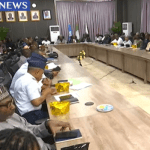Airline operating licenses in the country with scheduled flights will now have a five-year validity period.
Director general of the Nigerian civil aviation Authority Musa Nuhu made this known at a stakeholder consultation meeting in Abuja.
This new development is a deviation from the previous three-year validity period which the Operators previously had and private jet operators and non-scheduled flights will also now be having a three-year license validity period.
The stakeholders consultative meeting on the proposed amendment to the Nigerian civil aviation regulations, imputes are being sought from industry stakeholders.
The NCAA makes part of the document’s provisions known to include that Airlines operating scheduled flights in the country would now have a five-year license validity as opposed to the previous three years.
Private jet operators who are known scheduled will however be having a three-year license validity.
There is also a provision that drones will be officially regulated.
In his opening remarks, the Director General NCAA, Capt Musa Nuhu, disclosed the reviewed penalties upwards for violators in the industry with the maximum penalty for airlines standing at N10 million while the minimum at N1m.
Nuhu, however, stated that the upward review of penalties is not punitive but was guided by current realities in line with the International Civil Aviation Organisation.

He added that the powers of the NCAA to regulate civil aviation in Nigeria are captured throughout the Civil Aviation Act 2022, and that Section 31 of the Act empowers the authority to make regulations on all aspects of civil aviation matters.
“As required by Article 37 of the Convention on International Civil Aviation (Adoption of International Standards and Procedures), these Regulations are made to cover and domesticate all ICAO Standards that are contained in the relevant Annexes,” Nuhu said, adding that the regulations also address pertinent national matters.
According to him, the stakeholders’ consultation is in accordance with the obligation imposed on the Authority in section 31(5) of the Civil Aviation Act 2022 which states that “the exercise of its power to make regulations under this section, the authority shall consult with stakeholders including airlines, aerodrome operators, air traffic control service providers, consumers and other relevant bodies and organisations in the aviation industry.”
The NCAA boss also said that stakeholders are invited to note that all comments received from stakeholders pursuant to the Notice of Proposed Amendments published on February 12, 2023, in accordance with the approved NCAA rule-making process manual will be responded to by the NCAA.
During the interactive session, some key players noted that some operators have been punished unjustifiably for actions not properly investigated and penalties slammed on the operators without any reference to International Civil Aviation Organisation or any regulatory body.
The NCAA urges all to work towards the industry’s growth.
The meeting also deliberated on putting retirement age for Pilots at 75 but the regulatory body says the process would need a risk analysis and Regulatory impact assessment so the account was standard of 65 years would be maintained for the time being.
Airline operating licenses in the country with scheduled flights will now have a five-year validity period.
Director general of the Nigerian civil aviation Authority Musa Nuhu made this known at a stakeholder consultation meeting in Abuja.
This new development is a deviation from the previous three-year validity period which the Operators previously had and private jet operators and non-scheduled flights will also now be having a three-year license validity period.
The stakeholders consultative meeting on the proposed amendment to the Nigerian civil aviation regulations, imputes are being sought from industry stakeholders.
The NCAA makes part of the document’s provisions known to include that Airlines operating scheduled flights in the country would now have a five-year license validity as opposed to the previous three years.
Private jet operators who are known scheduled will however be having a three-year license validity.
There is also a provision that drones will be officially regulated.
In his opening remarks, the Director General NCAA, Capt Musa Nuhu, disclosed the reviewed penalties upwards for violators in the industry with the maximum penalty for airlines standing at N10 million while the minimum at N1m.
Nuhu, however, stated that the upward review of penalties is not punitive but was guided by current realities in line with the International Civil Aviation Organisation.

He added that the powers of the NCAA to regulate civil aviation in Nigeria are captured throughout the Civil Aviation Act 2022, and that Section 31 of the Act empowers the authority to make regulations on all aspects of civil aviation matters.
“As required by Article 37 of the Convention on International Civil Aviation (Adoption of International Standards and Procedures), these Regulations are made to cover and domesticate all ICAO Standards that are contained in the relevant Annexes,” Nuhu said, adding that the regulations also address pertinent national matters.
According to him, the stakeholders’ consultation is in accordance with the obligation imposed on the Authority in section 31(5) of the Civil Aviation Act 2022 which states that “the exercise of its power to make regulations under this section, the authority shall consult with stakeholders including airlines, aerodrome operators, air traffic control service providers, consumers and other relevant bodies and organisations in the aviation industry.”
The NCAA boss also said that stakeholders are invited to note that all comments received from stakeholders pursuant to the Notice of Proposed Amendments published on February 12, 2023, in accordance with the approved NCAA rule-making process manual will be responded to by the NCAA.
During the interactive session, some key players noted that some operators have been punished unjustifiably for actions not properly investigated and penalties slammed on the operators without any reference to International Civil Aviation Organisation or any regulatory body.
The NCAA urges all to work towards the industry’s growth.
The meeting also deliberated on putting retirement age for Pilots at 75 but the regulatory body says the process would need a risk analysis and Regulatory impact assessment so the account was standard of 65 years would be maintained for the time being.
Airline operating licenses in the country with scheduled flights will now have a five-year validity period.
Director general of the Nigerian civil aviation Authority Musa Nuhu made this known at a stakeholder consultation meeting in Abuja.
This new development is a deviation from the previous three-year validity period which the Operators previously had and private jet operators and non-scheduled flights will also now be having a three-year license validity period.
The stakeholders consultative meeting on the proposed amendment to the Nigerian civil aviation regulations, imputes are being sought from industry stakeholders.
The NCAA makes part of the document’s provisions known to include that Airlines operating scheduled flights in the country would now have a five-year license validity as opposed to the previous three years.
Private jet operators who are known scheduled will however be having a three-year license validity.
There is also a provision that drones will be officially regulated.
In his opening remarks, the Director General NCAA, Capt Musa Nuhu, disclosed the reviewed penalties upwards for violators in the industry with the maximum penalty for airlines standing at N10 million while the minimum at N1m.
Nuhu, however, stated that the upward review of penalties is not punitive but was guided by current realities in line with the International Civil Aviation Organisation.

He added that the powers of the NCAA to regulate civil aviation in Nigeria are captured throughout the Civil Aviation Act 2022, and that Section 31 of the Act empowers the authority to make regulations on all aspects of civil aviation matters.
“As required by Article 37 of the Convention on International Civil Aviation (Adoption of International Standards and Procedures), these Regulations are made to cover and domesticate all ICAO Standards that are contained in the relevant Annexes,” Nuhu said, adding that the regulations also address pertinent national matters.
According to him, the stakeholders’ consultation is in accordance with the obligation imposed on the Authority in section 31(5) of the Civil Aviation Act 2022 which states that “the exercise of its power to make regulations under this section, the authority shall consult with stakeholders including airlines, aerodrome operators, air traffic control service providers, consumers and other relevant bodies and organisations in the aviation industry.”
The NCAA boss also said that stakeholders are invited to note that all comments received from stakeholders pursuant to the Notice of Proposed Amendments published on February 12, 2023, in accordance with the approved NCAA rule-making process manual will be responded to by the NCAA.
During the interactive session, some key players noted that some operators have been punished unjustifiably for actions not properly investigated and penalties slammed on the operators without any reference to International Civil Aviation Organisation or any regulatory body.
The NCAA urges all to work towards the industry’s growth.
The meeting also deliberated on putting retirement age for Pilots at 75 but the regulatory body says the process would need a risk analysis and Regulatory impact assessment so the account was standard of 65 years would be maintained for the time being.
Airline operating licenses in the country with scheduled flights will now have a five-year validity period.
Director general of the Nigerian civil aviation Authority Musa Nuhu made this known at a stakeholder consultation meeting in Abuja.
This new development is a deviation from the previous three-year validity period which the Operators previously had and private jet operators and non-scheduled flights will also now be having a three-year license validity period.
The stakeholders consultative meeting on the proposed amendment to the Nigerian civil aviation regulations, imputes are being sought from industry stakeholders.
The NCAA makes part of the document’s provisions known to include that Airlines operating scheduled flights in the country would now have a five-year license validity as opposed to the previous three years.
Private jet operators who are known scheduled will however be having a three-year license validity.
There is also a provision that drones will be officially regulated.
In his opening remarks, the Director General NCAA, Capt Musa Nuhu, disclosed the reviewed penalties upwards for violators in the industry with the maximum penalty for airlines standing at N10 million while the minimum at N1m.
Nuhu, however, stated that the upward review of penalties is not punitive but was guided by current realities in line with the International Civil Aviation Organisation.

He added that the powers of the NCAA to regulate civil aviation in Nigeria are captured throughout the Civil Aviation Act 2022, and that Section 31 of the Act empowers the authority to make regulations on all aspects of civil aviation matters.
“As required by Article 37 of the Convention on International Civil Aviation (Adoption of International Standards and Procedures), these Regulations are made to cover and domesticate all ICAO Standards that are contained in the relevant Annexes,” Nuhu said, adding that the regulations also address pertinent national matters.
According to him, the stakeholders’ consultation is in accordance with the obligation imposed on the Authority in section 31(5) of the Civil Aviation Act 2022 which states that “the exercise of its power to make regulations under this section, the authority shall consult with stakeholders including airlines, aerodrome operators, air traffic control service providers, consumers and other relevant bodies and organisations in the aviation industry.”
The NCAA boss also said that stakeholders are invited to note that all comments received from stakeholders pursuant to the Notice of Proposed Amendments published on February 12, 2023, in accordance with the approved NCAA rule-making process manual will be responded to by the NCAA.
During the interactive session, some key players noted that some operators have been punished unjustifiably for actions not properly investigated and penalties slammed on the operators without any reference to International Civil Aviation Organisation or any regulatory body.
The NCAA urges all to work towards the industry’s growth.
The meeting also deliberated on putting retirement age for Pilots at 75 but the regulatory body says the process would need a risk analysis and Regulatory impact assessment so the account was standard of 65 years would be maintained for the time being.
Airline operating licenses in the country with scheduled flights will now have a five-year validity period.
Director general of the Nigerian civil aviation Authority Musa Nuhu made this known at a stakeholder consultation meeting in Abuja.
This new development is a deviation from the previous three-year validity period which the Operators previously had and private jet operators and non-scheduled flights will also now be having a three-year license validity period.
The stakeholders consultative meeting on the proposed amendment to the Nigerian civil aviation regulations, imputes are being sought from industry stakeholders.
The NCAA makes part of the document’s provisions known to include that Airlines operating scheduled flights in the country would now have a five-year license validity as opposed to the previous three years.
Private jet operators who are known scheduled will however be having a three-year license validity.
There is also a provision that drones will be officially regulated.
In his opening remarks, the Director General NCAA, Capt Musa Nuhu, disclosed the reviewed penalties upwards for violators in the industry with the maximum penalty for airlines standing at N10 million while the minimum at N1m.
Nuhu, however, stated that the upward review of penalties is not punitive but was guided by current realities in line with the International Civil Aviation Organisation.

He added that the powers of the NCAA to regulate civil aviation in Nigeria are captured throughout the Civil Aviation Act 2022, and that Section 31 of the Act empowers the authority to make regulations on all aspects of civil aviation matters.
“As required by Article 37 of the Convention on International Civil Aviation (Adoption of International Standards and Procedures), these Regulations are made to cover and domesticate all ICAO Standards that are contained in the relevant Annexes,” Nuhu said, adding that the regulations also address pertinent national matters.
According to him, the stakeholders’ consultation is in accordance with the obligation imposed on the Authority in section 31(5) of the Civil Aviation Act 2022 which states that “the exercise of its power to make regulations under this section, the authority shall consult with stakeholders including airlines, aerodrome operators, air traffic control service providers, consumers and other relevant bodies and organisations in the aviation industry.”
The NCAA boss also said that stakeholders are invited to note that all comments received from stakeholders pursuant to the Notice of Proposed Amendments published on February 12, 2023, in accordance with the approved NCAA rule-making process manual will be responded to by the NCAA.
During the interactive session, some key players noted that some operators have been punished unjustifiably for actions not properly investigated and penalties slammed on the operators without any reference to International Civil Aviation Organisation or any regulatory body.
The NCAA urges all to work towards the industry’s growth.
The meeting also deliberated on putting retirement age for Pilots at 75 but the regulatory body says the process would need a risk analysis and Regulatory impact assessment so the account was standard of 65 years would be maintained for the time being.
Airline operating licenses in the country with scheduled flights will now have a five-year validity period.
Director general of the Nigerian civil aviation Authority Musa Nuhu made this known at a stakeholder consultation meeting in Abuja.
This new development is a deviation from the previous three-year validity period which the Operators previously had and private jet operators and non-scheduled flights will also now be having a three-year license validity period.
The stakeholders consultative meeting on the proposed amendment to the Nigerian civil aviation regulations, imputes are being sought from industry stakeholders.
The NCAA makes part of the document’s provisions known to include that Airlines operating scheduled flights in the country would now have a five-year license validity as opposed to the previous three years.
Private jet operators who are known scheduled will however be having a three-year license validity.
There is also a provision that drones will be officially regulated.
In his opening remarks, the Director General NCAA, Capt Musa Nuhu, disclosed the reviewed penalties upwards for violators in the industry with the maximum penalty for airlines standing at N10 million while the minimum at N1m.
Nuhu, however, stated that the upward review of penalties is not punitive but was guided by current realities in line with the International Civil Aviation Organisation.

He added that the powers of the NCAA to regulate civil aviation in Nigeria are captured throughout the Civil Aviation Act 2022, and that Section 31 of the Act empowers the authority to make regulations on all aspects of civil aviation matters.
“As required by Article 37 of the Convention on International Civil Aviation (Adoption of International Standards and Procedures), these Regulations are made to cover and domesticate all ICAO Standards that are contained in the relevant Annexes,” Nuhu said, adding that the regulations also address pertinent national matters.
According to him, the stakeholders’ consultation is in accordance with the obligation imposed on the Authority in section 31(5) of the Civil Aviation Act 2022 which states that “the exercise of its power to make regulations under this section, the authority shall consult with stakeholders including airlines, aerodrome operators, air traffic control service providers, consumers and other relevant bodies and organisations in the aviation industry.”
The NCAA boss also said that stakeholders are invited to note that all comments received from stakeholders pursuant to the Notice of Proposed Amendments published on February 12, 2023, in accordance with the approved NCAA rule-making process manual will be responded to by the NCAA.
During the interactive session, some key players noted that some operators have been punished unjustifiably for actions not properly investigated and penalties slammed on the operators without any reference to International Civil Aviation Organisation or any regulatory body.
The NCAA urges all to work towards the industry’s growth.
The meeting also deliberated on putting retirement age for Pilots at 75 but the regulatory body says the process would need a risk analysis and Regulatory impact assessment so the account was standard of 65 years would be maintained for the time being.
Airline operating licenses in the country with scheduled flights will now have a five-year validity period.
Director general of the Nigerian civil aviation Authority Musa Nuhu made this known at a stakeholder consultation meeting in Abuja.
This new development is a deviation from the previous three-year validity period which the Operators previously had and private jet operators and non-scheduled flights will also now be having a three-year license validity period.
The stakeholders consultative meeting on the proposed amendment to the Nigerian civil aviation regulations, imputes are being sought from industry stakeholders.
The NCAA makes part of the document’s provisions known to include that Airlines operating scheduled flights in the country would now have a five-year license validity as opposed to the previous three years.
Private jet operators who are known scheduled will however be having a three-year license validity.
There is also a provision that drones will be officially regulated.
In his opening remarks, the Director General NCAA, Capt Musa Nuhu, disclosed the reviewed penalties upwards for violators in the industry with the maximum penalty for airlines standing at N10 million while the minimum at N1m.
Nuhu, however, stated that the upward review of penalties is not punitive but was guided by current realities in line with the International Civil Aviation Organisation.

He added that the powers of the NCAA to regulate civil aviation in Nigeria are captured throughout the Civil Aviation Act 2022, and that Section 31 of the Act empowers the authority to make regulations on all aspects of civil aviation matters.
“As required by Article 37 of the Convention on International Civil Aviation (Adoption of International Standards and Procedures), these Regulations are made to cover and domesticate all ICAO Standards that are contained in the relevant Annexes,” Nuhu said, adding that the regulations also address pertinent national matters.
According to him, the stakeholders’ consultation is in accordance with the obligation imposed on the Authority in section 31(5) of the Civil Aviation Act 2022 which states that “the exercise of its power to make regulations under this section, the authority shall consult with stakeholders including airlines, aerodrome operators, air traffic control service providers, consumers and other relevant bodies and organisations in the aviation industry.”
The NCAA boss also said that stakeholders are invited to note that all comments received from stakeholders pursuant to the Notice of Proposed Amendments published on February 12, 2023, in accordance with the approved NCAA rule-making process manual will be responded to by the NCAA.
During the interactive session, some key players noted that some operators have been punished unjustifiably for actions not properly investigated and penalties slammed on the operators without any reference to International Civil Aviation Organisation or any regulatory body.
The NCAA urges all to work towards the industry’s growth.
The meeting also deliberated on putting retirement age for Pilots at 75 but the regulatory body says the process would need a risk analysis and Regulatory impact assessment so the account was standard of 65 years would be maintained for the time being.
Airline operating licenses in the country with scheduled flights will now have a five-year validity period.
Director general of the Nigerian civil aviation Authority Musa Nuhu made this known at a stakeholder consultation meeting in Abuja.
This new development is a deviation from the previous three-year validity period which the Operators previously had and private jet operators and non-scheduled flights will also now be having a three-year license validity period.
The stakeholders consultative meeting on the proposed amendment to the Nigerian civil aviation regulations, imputes are being sought from industry stakeholders.
The NCAA makes part of the document’s provisions known to include that Airlines operating scheduled flights in the country would now have a five-year license validity as opposed to the previous three years.
Private jet operators who are known scheduled will however be having a three-year license validity.
There is also a provision that drones will be officially regulated.
In his opening remarks, the Director General NCAA, Capt Musa Nuhu, disclosed the reviewed penalties upwards for violators in the industry with the maximum penalty for airlines standing at N10 million while the minimum at N1m.
Nuhu, however, stated that the upward review of penalties is not punitive but was guided by current realities in line with the International Civil Aviation Organisation.

He added that the powers of the NCAA to regulate civil aviation in Nigeria are captured throughout the Civil Aviation Act 2022, and that Section 31 of the Act empowers the authority to make regulations on all aspects of civil aviation matters.
“As required by Article 37 of the Convention on International Civil Aviation (Adoption of International Standards and Procedures), these Regulations are made to cover and domesticate all ICAO Standards that are contained in the relevant Annexes,” Nuhu said, adding that the regulations also address pertinent national matters.
According to him, the stakeholders’ consultation is in accordance with the obligation imposed on the Authority in section 31(5) of the Civil Aviation Act 2022 which states that “the exercise of its power to make regulations under this section, the authority shall consult with stakeholders including airlines, aerodrome operators, air traffic control service providers, consumers and other relevant bodies and organisations in the aviation industry.”
The NCAA boss also said that stakeholders are invited to note that all comments received from stakeholders pursuant to the Notice of Proposed Amendments published on February 12, 2023, in accordance with the approved NCAA rule-making process manual will be responded to by the NCAA.
During the interactive session, some key players noted that some operators have been punished unjustifiably for actions not properly investigated and penalties slammed on the operators without any reference to International Civil Aviation Organisation or any regulatory body.
The NCAA urges all to work towards the industry’s growth.
The meeting also deliberated on putting retirement age for Pilots at 75 but the regulatory body says the process would need a risk analysis and Regulatory impact assessment so the account was standard of 65 years would be maintained for the time being.














